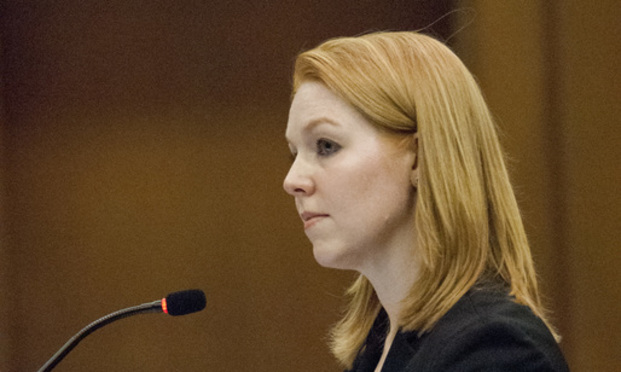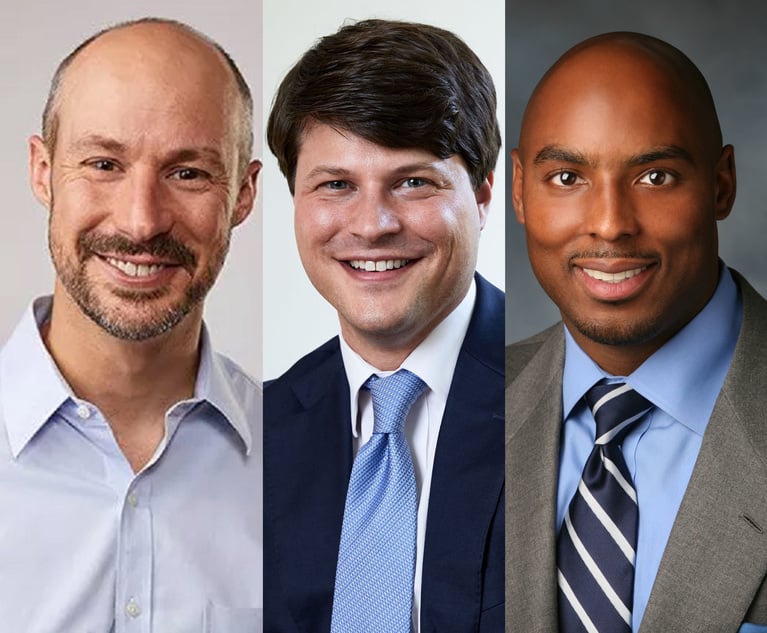Questions for the Bench: Justice Sarah Warren of the Georgia Supreme Court
She admires Justice Clarence Thomas' approach to writing; he was once quoted as saying, “the genius is not to write a five cent idea in a ten dollar sentence. It's to put a ten dollar idea in a five cent sentence.”
April 22, 2019 at 11:47 AM
7 minute read
 Justice Sarah Warren (Photo: John Disney/ALM)
Justice Sarah Warren (Photo: John Disney/ALM)
Gov. Nathan Deal last year appointed Sarah Hawkins Warren, the solicitor general for the state Law Department, to the state Supreme Court.
Warren followed in the footsteps of Georgia Supreme Court Justices Nels Peterson and Britt Grant (now on the U.S. Court of Appeals for the Eleventh Circuit) to the job of solicitor general after working in the Washington office of Kirkland & Ellis.
Warren clerked for two federal judges: now Senior Judge J.L. Edmondson of the Eleventh Circuit and Judge Richard Leon of the U.S. District Court for the District of Columbia. She agreed to be our latest subject for “Questions for the Bench.”
What prompted you to seek an appointment to the Supreme Court?
My work for the attorney general was focused on defending the laws and Constitution of our State. In my role as solicitor general, I spent a lot of time thinking about statutory and constitutional interpretation, and observing how the Supreme Court of Georgia approached those issues. In the process, I further developed my own jurisprudence and began to value even more the role of the Judiciary as a branch that does not write policy or impose personal preference, but that instead interprets and applies the law. At the encouragement of friends and mentors, I applied for a seat on the court because I didn't just want to be an advocate for my client's legal position (even though I very much enjoyed my job representing the state); I wanted to play a part in interpreting the law in our state. I was honored and humbled when Governor Deal appointed me.
What do you like most about being a justice?
I love coming to work every day knowing that I am serving the people of our state. On a practical level, though, the best part of my job is the combination of academics and personal interaction. I love the intellectual rigor of the work, the opportunity to engage in thoughtful discussion with colleagues and with my law clerks and the ability to interact with attorneys through oral argument and through the court's work supervising the bar. It is never lost on me that the cases we decide are of great importance to the parties and to the public. It is an honor to be entrusted with that responsibility.
What keeps you up at night regarding your work?
So many of our cases are really tough, both factually and legally. It's hard not to keep thinking about—and mentally working through—complex legal issues, even when I'm not at work. And it's hard to forget the difficult factual scenarios that are often presented in the cases before our court. We all work hard to apply the law fairly and impartially, and my preoccupation with getting the law right doesn't end when I leave chambers each day.
What are your pet peeves in briefs and arguments?
Two of my big pet peeves in briefs are lack of clarity and harsh tone. With respect to clarity, a legal argument should be written so clearly that someone who is not a subject-matter expert can understand the legal arguments and why the reasoning offered in a brief compels a given result for the client.
With respect to tone, it is rarely (if ever) helpful for an attorney to be snarky in a brief. As a former litigator, I understand how trial attorneys can feel wronged by things that happened or decisions that were made in the underlying litigation. But by the time a case reaches our court, the briefs should be focused on legal issues and should be unencumbered by attacks on the other party.
With respect to argument, I am always surprised when an attorney is not prepared to engage with the court. We want oral argument to be a conversation between the advocates and the Justices, not a mere recitation of written briefs. A great way to prepare for that experience is to watch prior oral arguments—even arguments focusing on different legal issues—that are posted on the Supreme Court website.
What have you learned about oral advocacy now that you are on the receiving end of arguments instead of the one making the argument?
When I was an advocate, it was my job to know everything about a case so that I could engage in one 20-minute oral argument with the court. Now that I am a Justice, I participate in five or more oral arguments per day, often multiple days in a row each month. That has given me the opportunity to observe a wide range of advocacy, and it has confirmed that the best oral advocates are the ones who have prepared thoroughly, have “mooted” or practiced their arguments in an adversarial setting before coming to court, and have internalized their arguments so well that they can respond to questions from the court and then pivot right back to their points of advocacy.
What U.S. Supreme Court justice who served in the past 20 years would you like to emulate and why?
It's hard to pinpoint just one justice. It is important to acknowledge the trailblazing career of Sandra Day O'Connor, the first woman to serve as a Justice on the U.S. Supreme Court. I appreciate the late Justice Antonin Scalia, whose scholarship and opinion-writing reinvigorated textualism. And I admire Justice Clarence Thomas' approach to writing, which is aimed at making legal opinions clear and accessible. I once read an article where he was quoted as saying: “the beauty, the genius is not to write a five cent idea in a ten dollar sentence. It's to put a ten dollar idea in a five cent sentence.” It takes time and care to translate complex legal ideas into plain English, but that is something I try to do in my own work.
What drew you to major in Spanish at Duke?
When I took Spanish classes in junior high and high school, I realized I had an aptitude for language. I had wonderful teachers who encouraged my interest, and I was ultimately able to take classes in Spanish literature in high school—including an independent study that I created my senior year. I wanted to keep pursuing that interest in college, which led me to double-major in both Public Policy and Spanish.
Since you went to Duke for undergraduate and law school, we have to assume you are a basketball fan. If so, do you have a favorite basketball memory?
Winning the national championship in 2001—my freshman year—was unforgettable. It also had the unfortunate effect of making me think we'd win a national championship every year! That wasn't in the cards, but it's still a lot of fun to cheer for the Blue Devils.
Related articles
Questions for the Bench: Judge Trent Brown of the Georgia Court of Appeals
Questions for the Bench: Judge Mark Cohen of the U.S. District Court
This content has been archived. It is available through our partners, LexisNexis® and Bloomberg Law.
To view this content, please continue to their sites.
Not a Lexis Subscriber?
Subscribe Now
Not a Bloomberg Law Subscriber?
Subscribe Now
NOT FOR REPRINT
© 2025 ALM Global, LLC, All Rights Reserved. Request academic re-use from www.copyright.com. All other uses, submit a request to [email protected]. For more information visit Asset & Logo Licensing.
You Might Like
View All

Spalding Jurors Return $12M Verdict Against State Farm Insurance Client
10 minute readTrending Stories
- 1Snapshot Judgement: The Case Against Illustrated Indictments
- 2Texas Supreme Court Grapples Over Fifth Circuit Question on State Usury Law
- 3Exploring the Opportunities and Risks for Generative AI and Corporate Databases: An Introduction
- 4Farella Elevates First Female Firmwide Managing Partners
- 5Family Court 2024 Roundup: Part I
Who Got The Work
J. Brugh Lower of Gibbons has entered an appearance for industrial equipment supplier Devco Corporation in a pending trademark infringement lawsuit. The suit, accusing the defendant of selling knock-off Graco products, was filed Dec. 18 in New Jersey District Court by Rivkin Radler on behalf of Graco Inc. and Graco Minnesota. The case, assigned to U.S. District Judge Zahid N. Quraishi, is 3:24-cv-11294, Graco Inc. et al v. Devco Corporation.
Who Got The Work
Rebecca Maller-Stein and Kent A. Yalowitz of Arnold & Porter Kaye Scholer have entered their appearances for Hanaco Venture Capital and its executives, Lior Prosor and David Frankel, in a pending securities lawsuit. The action, filed on Dec. 24 in New York Southern District Court by Zell, Aron & Co. on behalf of Goldeneye Advisors, accuses the defendants of negligently and fraudulently managing the plaintiff's $1 million investment. The case, assigned to U.S. District Judge Vernon S. Broderick, is 1:24-cv-09918, Goldeneye Advisors, LLC v. Hanaco Venture Capital, Ltd. et al.
Who Got The Work
Attorneys from A&O Shearman has stepped in as defense counsel for Toronto-Dominion Bank and other defendants in a pending securities class action. The suit, filed Dec. 11 in New York Southern District Court by Bleichmar Fonti & Auld, accuses the defendants of concealing the bank's 'pervasive' deficiencies in regards to its compliance with the Bank Secrecy Act and the quality of its anti-money laundering controls. The case, assigned to U.S. District Judge Arun Subramanian, is 1:24-cv-09445, Gonzalez v. The Toronto-Dominion Bank et al.
Who Got The Work
Crown Castle International, a Pennsylvania company providing shared communications infrastructure, has turned to Luke D. Wolf of Gordon Rees Scully Mansukhani to fend off a pending breach-of-contract lawsuit. The court action, filed Nov. 25 in Michigan Eastern District Court by Hooper Hathaway PC on behalf of The Town Residences LLC, accuses Crown Castle of failing to transfer approximately $30,000 in utility payments from T-Mobile in breach of a roof-top lease and assignment agreement. The case, assigned to U.S. District Judge Susan K. Declercq, is 2:24-cv-13131, The Town Residences LLC v. T-Mobile US, Inc. et al.
Who Got The Work
Wilfred P. Coronato and Daniel M. Schwartz of McCarter & English have stepped in as defense counsel to Electrolux Home Products Inc. in a pending product liability lawsuit. The court action, filed Nov. 26 in New York Eastern District Court by Poulos Lopiccolo PC and Nagel Rice LLP on behalf of David Stern, alleges that the defendant's refrigerators’ drawers and shelving repeatedly break and fall apart within months after purchase. The case, assigned to U.S. District Judge Joan M. Azrack, is 2:24-cv-08204, Stern v. Electrolux Home Products, Inc.
Featured Firms
Law Offices of Gary Martin Hays & Associates, P.C.
(470) 294-1674
Law Offices of Mark E. Salomone
(857) 444-6468
Smith & Hassler
(713) 739-1250








